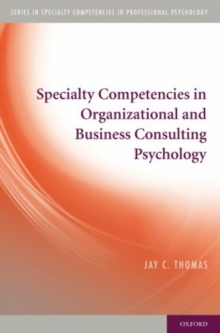
Specialty Competencies in Cognitive and Behavioral Psychology PDF
by Christine Maguth Nezu, Christopher R. Martell, Arthur M. Nezu
Part of the Specialty Competencies in Professional Psychology series
Description
Devoted to providing readers with a state of the art guide to the competencies required for the specialty practice of cognitive and behavioral psychology, Specialty Competencies in Cognitive and Behavioral Psychology describes and defines the foundational and functional competencies that guide best practices in this specialty. Influenced by a profession-wide recognition of the unique and distinct nature among psychological specialty practice as well as efforts to define professional competence, this book illustrates how cognitive and behavioral psychologists actualize each area of professional activity associated with the areas of competence currently delineated by professional psychology through national consensus working groups and conferences. Sections of this book provide information for best practices designated under the main areas of foundational and functional competencies, with each chapter focused on a specific area of competence. These include chapters focused on foundational knowledge that informs competent cognitive and behavioral specialists, with regard to theory and scientific research, ethical practice, and competence in individual and multicultural diversity. Delineated functional areas of competence include assessment methods, case formulation, interventions, consultation, supervision, and teaching. Professional competencies with regard to therapeutic and collegial interpersonal interactions and identity as well as continuing professional development are also addressed. This book will be an important resource for all professional psychologists interested in developing competencies in the cognitive behavioral psychology specialty, and especially for current applicants seeking board certification through the American Board of Cognitive and Behavioral Psychology, a recognized specialty board of the American Board of Professional Psychology (ABPP). Series in Specialty Competencies in Professional PsychologySeries EditorsArthur M. Nezu and Christine Maguth NezuAs the field of psychology continues to grow and new specialty areas emerge and achieve recognition, it has become increasingly important to define the standards of professional specialty practice. Developed and conceived in response to this need for practical guidelines, this series presents methods, strategies, and techniques for conducting day-to-day practice in any given psychology specialty. The topical volumes address best practices across the functional and foundational competencies that characterize the various psychology specialties, including clinical psychology, cognitive and behavioral psychology, school psychology, geropsychology, forensic psychology, clinical neuropsychology, couples and family psychology, and more. Functional competencies include common practice activities like assessment and intervention, while foundational competencies represent core knowledge areas such as ethical and legal issues, cultural diversity, and professional identification. In addition to describing these competencies, each volume provides a definition, description, and development timeline of a particular specialty, including its essential and characteristic pattern of activities, as well as its distinctive and unique features. Written by recognized experts in their respective fields, volumes are comprehensive, up-to-date, and accessible. These volumes offer invaluable guidance to not only practicing mental health professionals, but those training for specialty practice as well.
Information
-
Download - Immediately Available
- Format:PDF
- Publisher:Oxford University Press
- Publication Date:04/10/2013
- Category:
- ISBN:9780199700233
Information
-
Download - Immediately Available
- Format:PDF
- Publisher:Oxford University Press
- Publication Date:04/10/2013
- Category:
- ISBN:9780199700233










